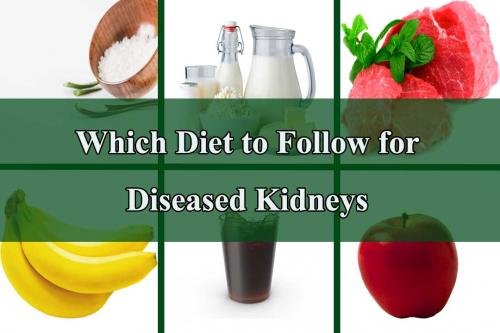A Kidney-Friendly Diet To Reverse Chronic Kidney Disease

What is a renal diet?
A renal diet is a diet that has all the kidney-friendly nutrients in a limited amount as your kidneys can process. It means limiting certain food, fruits, and drinks in the daily eating regimen so that fluid retention can be prevented in the cells and tissues of the body. DASH diet is a healthy approach to prevent kidney disease and hypertension. A DASH diet is a diet rich in vegetables, fruits, and other food products low in dairy fat, sodium, sugar, etc to reverse chronic kidney disease.
Steps to healthy diet for the kidneys
1. Make food with less salt and sodium
In order to help control blood pressure, you should not consume more than 2300 mg of sodium if you are otherwise healthy. But if your blood pressure is already high and you have mildly damaged kidneys, you should reduce this 2300 mg of sodium consumption to 1600 gm only. To cut down sodium from your diet, make sure you are eating less salt and sodium-based products such as processed food. Nowadays, processed food or packed food or canned products are rich in sodium to increase their shelf-life. Alternatively, you can also spices, seasonings, and herbs in place of salt. Buy fresh food from the market, rinse them properly, and cook it from the scratch at your home with less salt and olive oil to reverse chronic kidney disease.
Sources of sodium to avoid
• Canned food
• Salt
• Regular canned vegetables
• Hot dogs
• Canned soup
• Tomato sauce
• Snack food
2. Eat the right amount of protein
When the kidneys are damaged, they may not allow the protein to process. When you consume protein, the body produces waste which is ought to be eliminated by the kidneys. Consuming more protein means, the kidneys have to work harder to eliminate it from the blood. If you are on a renal diet, you should eat only a small portion of protein foods. Some people eat both plants and animals based protein, but if you have kidney disease, then ask the best doctor for kidney disease or a dietician about the right source or the right combination of both apt for you.
Animal sources of protein
• Chicken
• Fish
• Meat
• Eggs
• Dairy
A cooked portion of chicken, fish, or meat is about 2 to 3 ounces while a portion of dairy foods is only half a cup of milk or yogurt.
Plant based sources of foods
• Beans
• Nuts
• Grains
3. Choose the heart-healthy sources of food
When you eat sources of fat, then this fat may accumulate in the blood vessels related to the kidneys and your heart. Thus to avoid the fat from deposing into the blood vessels, you should eat only non-saturated sources of fat. Tips for you:
• Bake, roast or stir-fry foods instead of full frying
• Use only a small portion of olive oil
• Remove skin from the chicken to avoid fat consumption
• Saturated fat or trans fat is particularly unhealthy for the body
• Consume heart-healthy food such as fish, beans, vegetables, and low-fat sources of food
4. Avoid phosphorus
Excess phosphorus consumption is unhealthy for the kidneys. When you eat too much phosphorus, it starts to build-up in your blood that pulls out calcium from the bones, thereby making them weak. Hyperphosphatemia in your blood can cause itchy skin and joint pain. Nowadays packaged foods come with added phosphorus and so look for the labels before buying them to reverse chronic kidney disease.
To prevent the condition called Hyperphosphatemia during kidney disease, you should avoid:
• Egg yolks
• Beans
• Bran cereals
• Processed meats
• Cola or soft drinks
• Lemonade
5. Potassium should also be restricted in a kidney disease
Too much potassium in the blood can lead to a condition called hyperkalemia during kidney disease. Damaged kidneys allow potassium to build inside the bloodstream which can cause serious illness related to the heart such as heart palpitations. Excess potassium in the blood can also make the muscles to get weakened. Some salt substitutes are also rich in potassium and so should be restricted during kidney disease.
Low sources of potassium
• Apples
• Peaches
• White bread and pasta
• Cooked rice etc
• Cranberry juice
• White rice
High sources of potassium
• Oranges
• Bananas
• Beans and nuts
• Dairy products
• Brown rice
• Potatoes
• Tomatoes
Some medicines also contain potassium, so consult your doctor and a renal dietician and know the best diet for you. Taking allopathic medications can worsen the situation of your kidneys and so rely on chronic kidney disease treatment in Ayurveda to improve kidney function.
Additionally, a kidney patient should also limit alcohol and quit smoking to reverse chronic kidney disease. When you consume alcohol or smoke, these both activities can impact the bloodstream inside the body particularly those of the kidneys and the heart. Their consumption can also damage the liver, lungs, brain, and cause serious health issues.
To know more about dietary changes during CKD, consult Karma Ayurveda, an Ayurvedic kidney care hospital in Delhi, India. We also offer Ayurvedic treatment for naturally improving kidney function and revitalizing their health.
Advertise on APSense
This advertising space is available.
Post Your Ad Here
Post Your Ad Here
Comments